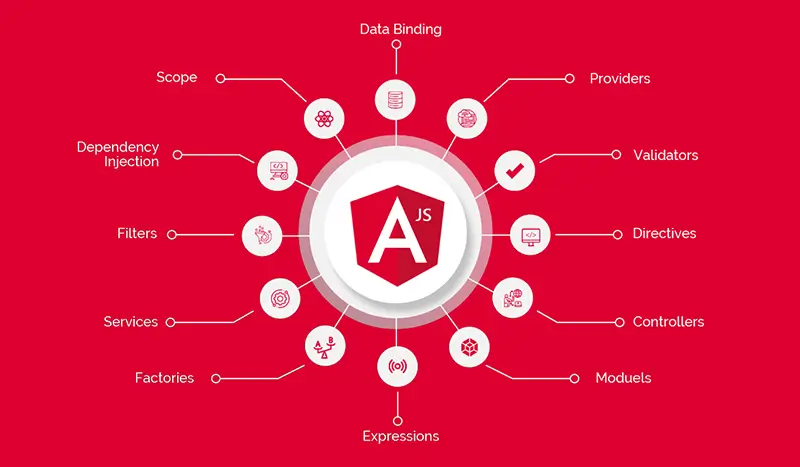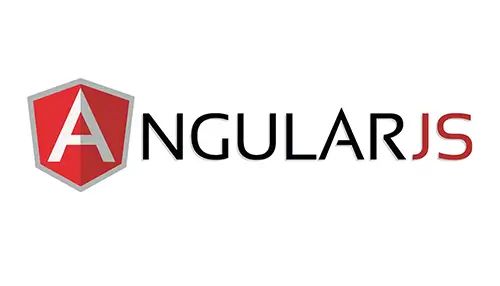We are way past the days of cluttered websites, broken links, as well as unresponsive websites. The modern web development era is here; and, it seems like the web development community has embraced it quite well. All the due credit goes to the tech giants across the world. Besides, AngularJS Framework is one of the few frameworks, brought into existence by Google which helps in building feature-rich single web applications. Furthermore, AngularJS Framework provides a platform to create faster, more responsive, interactive, and dynamic web applications.
From a business standpoint, the AngularJS framework provides equal opportunities to different businesses by rendering precise results according to the requirements of diverse business models. For instance, websites like Netflix, LEGO, The Guardian, PayPal, and many others are built on this platform.
What’s so special about AngularJS Framework?
AngularJS Framework is a JavaScript MVC framework built by Google to create viable and properly designed web applications. It helps you to use HTML as your template language, extending the HTML’s syntax to state your application’s components neatly. AngularJS is a great choice if:
- You are writing a concise testable JavaScript code,
- Your app is communicating with the server via XHR/JSONP, or
- You are creating a CRUD (create/read/update/delete) client-side app that can benefit from automatic DOM manipulation and data-binding which can be expressed using Angular’s declarative templates
Why should you adopt AngularJS Framework?
AngularJS Framework is a JavaScript library that offers tools for creating effective browser applications. It simplifies the application development by providing a higher level of abstraction to the developer. It strives to minimize the impedance mismatch between an application’s needs and the document-centric HTML by creating new HTML constructs.
AngularJS Framework helps you to overcome the following troubles:
- Registering callbacks: Registering callbacks often makes your code confusing. With Angular, you can remove the callbacks and common boilerplate code that helps to reduce the extent of JavaScript coding you need to do. Also, this makes it easier for you to analyze the working of your application.
- Arranging data to and from the UI: CRUD operations are the cornerstone of ‘AJAX applications’ jobs. The flow of data from the server to an internal object, to an HTML form, creates a lot of cluttered and confusing code. AngularJS helps to eliminate all this confusion, leaving the code that expresses the overall application flow instead of the implementation details.
- Manipulating HTML DOM programmatically: Manipulating HTML DOM is the basis of AJAX applications. However, the process is error-prone and cumbersome. By writing applications with Angular, you are no more confined to the low-level DOM manipulation tasks. It is possible to declaratively describe how the UI should change according to your application state changes.
- Writing a considerable amount of initialization code to get started: Generally, you have to write a lot of code just to get a standard “Hello World” AJAX app working. AngularJS lets you easily bootstrap your application using the services that are auto-injected into your app. This helps you to develop interactive features quickly while exploiting the entire initialization process in automated tests.
List of features that AngularJS Framework offers
1. Model View Controller (MVC) Framework
MVC is a software design pattern for developing web applications. It is made up of:
Model: the first level of the pattern which is responsible for maintaining data. It is similar to primitive data types like Booleans, numbers, strings or objects. It is the simplest script without any getter and sorter methods.
View: responsible for showing portions of data to the user. They present the data in a particular format triggered by the controller’s action.
Controller: controls the interaction between the Model and the View. It responds to user input and interacts with the data model objects. The controller receives the input, validates it, and then conducts the operations.
As AngularJS is an open-source script, the working model is based on MVC patterns and the newest client-side JavaScript. The Model View Framework Control Architecture in AngularJS is easy, versatile, and dynamic. MVC makes it easier to build a separate client-side application. With AngularJS, even if the MVC elements were developed separately, you can combine them. There is no need to write extra code to combine all the attributes together.
2. User interface with HTML
User interfaces in AngularJS are built on HTML. It is a declarative language that has shorter tags and is extremely easy to comprehend. Even the interface it provides is organized, smooth, and structured.
Many times, it becomes complex to develop, organize, and reorganize the JavaScript Interfaces. So, the HTML interface can also regulate the implementation of the application. So, rather than understanding program flow and loading, you can define what you want and AngularJS will carve out the dependencies.
3. POJO Model
As compared to other frameworks, AngularJS uses POJO (Plain Old JavaScript) objects. Now, that means you do not need to add additional getter and setter elements to bind AngularJS along with additional data sources.
A POJO model also provides spontaneous and well-planned objects. Developers have to create loops of objects and loops of arrays with the required properties. Then they need to adjust and reframe it. This makes AngularJS self-sufficient and easy to use. The well planned and quick application of the POJO model is one of the reasons to use AngularJS in your next development project.
4. Active community on Google
Whenever you want to adopt a framework for development, you always look for good community support. AngularJS doesn’t disappoint here either. AngularJS Framework is maintained by Google. In addition to that, it is released under the MIT license and is available for download on GitHub.
So, if you have any maintenance issues or get stuck somewhere, there are many forums where you can get your queries solved. Also, if you have any suggestions or can improve something, the source is easily available for download.
5. Routing
Routing is basically the transition from one view to another. Now, this is the key aspect of single-page applications.
In single-page applications, everything comes in one single page. Developers don’t want to redirect the users to a new page every time they click on a menu or a sub-menu. The developers want the content to load asynchronously on the same page with just the URL changing.
Almost all websites work on this method. Some of the popular platforms like the Chrome app store and Twitter are the best examples of Single Page Applications. This method helps the user feel as if they are interacting with a desktop app.
Now, with AngularJS Framework, this becomes an easy task and you can make various views for various URLs. AngularJS also enables you to load the appropriate view on the main page for a specific URL request. This is another reason why developers love AngularJS.
6. Two-way binding
Data binding is the automatic synchronization of data between the view and the model. The view indicates the HTML and the model indicates the JavaScript variables.
In AngularJS, you can easily build a template that can bind different components with different models. In this way, whenever the value of any HTML or view component differs, the bound model value also gets updated.
Let’s say if the input text value changes, the bound model is also changed and updated accordingly. To control the changing data, there is no need to program a separate set of callback functions. With two-way data binding, the application’s presentation layer becomes very simple. As a result, the UI is clean and has an improved appeal. Also, complex data manipulations and calculations can be done with ease.
Closing Thoughts
AngularJS has become an in-demand platform in the present-day marketplace because it is backed up by the tech giant, Google, and provides ample opportunities to create something new every day. Talking from a business standpoint, AngularJS is an ideal choice for enterprise development; and, this front-end framework’s focus mainly lies on code quality and testability, which is quintessential in the web development domain. Keeping some minor issues aside, like in any other framework, AngularJS is really great for developers. Thus, Angular is more popular than any other framework out there.
At Oditek Solutions, we provide quality web application developments that are performance-driven and scalable. Please reach out to us for the development of enterprise-grade application needs that require an excellent front-end user experience.







